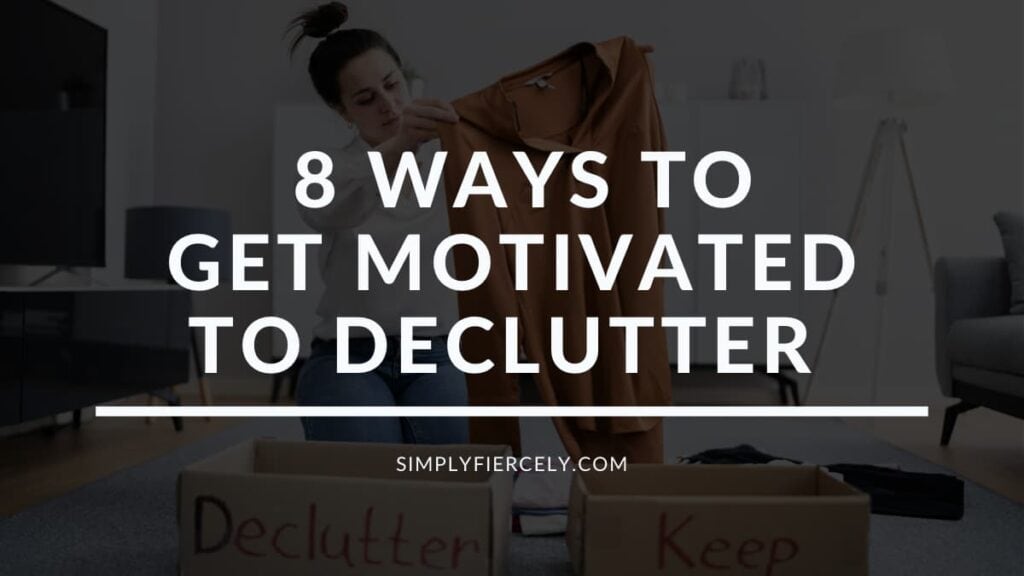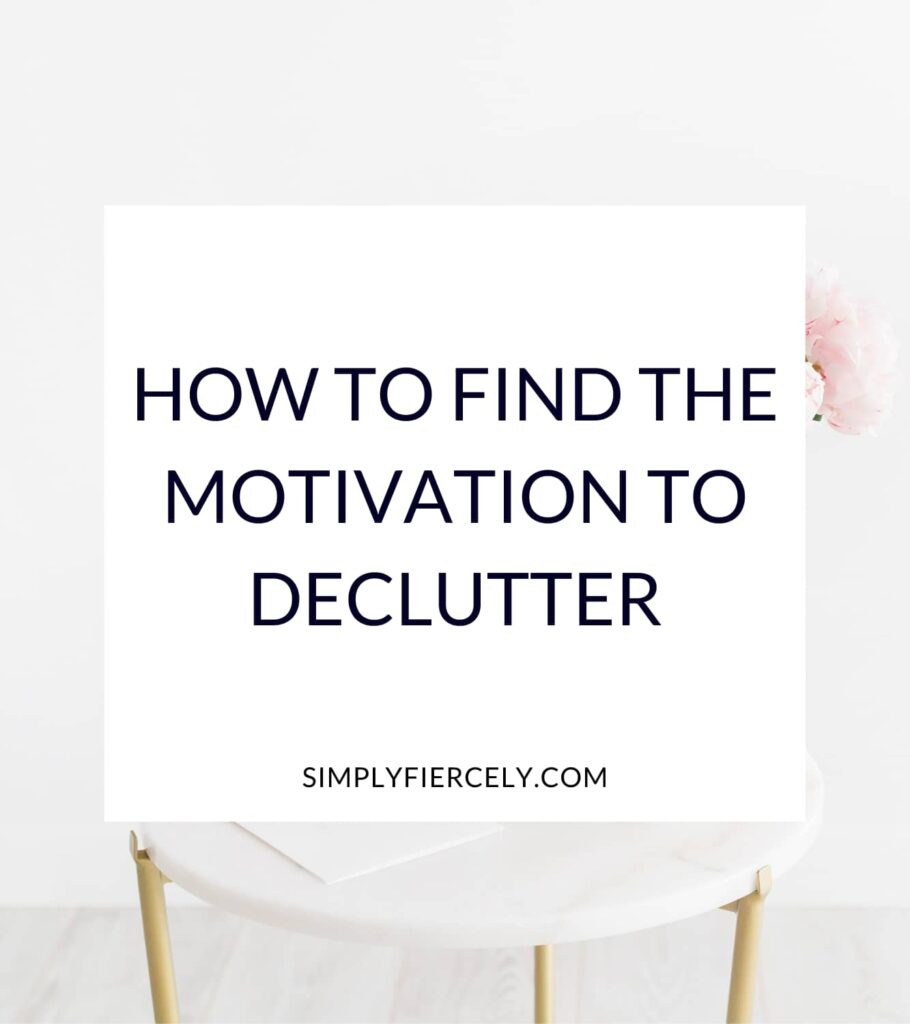Looking for motivation to declutter your home? Here are eight simple tips that will help you get motivated to clear your clutter and create space for joy this year.
Well, my friends, we’ve made it to February—also known as the month of good intentions. The goals we set at the start of the year (like decluttering your home) are slowly starting to fade as “life” gets in the way.
I get it and don’t worry; I’m not judging you! Taking on any big project is hard, and honestly, decluttering can be incredibly challenging. Over the years, I’ve learned that getting rid of stuff is never as simple as it first seems.
Our physical possessions can represent our hopes, dreams, and aspirations—so yes, letting go is hard. It can be emotionally and physically draining, so finding the right motivation to declutter is essential.
You need something that you can tap into, something that will help you keep going when times get tough, and that’s what this blog post is all about. If you’re wondering how to find the motivation to declutter, here are eight simple shifts that will make all the difference.

How To Get Motivated To Declutter
WHAT ARE YOU CHOOSING?
Simply put, you’ll feel motivated to declutter when the joy of letting go outweighs the pain of hanging on. You must want to change more than you want things to stay the same.
It’s simple (in theory) but not easy because of something called loss aversion. As humans, we naturally want to avoid pain more than we want to achieve similar gains.
This means that your “why” for decluttering needs to be powerful to motivate you. A vague desire to save time and money isn’t going to cut it. Instead, you need something that speaks to your soul—a big-picture reason for doing all the hard work.
Once you find this missing link, decluttering will be so much easier. Instead of obsessing over what you’re letting go, you’re focused on what you’re choosing for yourself. It’s a powerful mindset shift that made all the difference in my decluttering journey.
If you’re struggling to figure out your “why”, be sure to read about the most surprising way decluttering improves your life.
PICK THE RIGHT PROJECT
Next, decide where to start decluttering. Choose a project that creates momentum—keeping in mind that your starting point will depend a lot on your personality.
If you’re very goal-oriented (the type who loves checking things off a to-do list) it might be best to start with an easy win. Choose a small task that you can do quickly and effortlessly. You’ll feel good about getting it done and, more than likely, it will inspire you to keep going.
Alternatively, choose a project that has a direct impact on your “why”. For example, I wanted to make more time for myself. I had a stressful job at the time, so I prioritised decluttering my bedroom and creating a blissful retreat.
This was a great place to start because it meant I could experience the joy of a decluttered home from the moment I opened my eyes. It was also the last thing I saw at the end of a long day.
THINK ABOUT THE FUTURE
Research shows that the more connected we are with our future self, the more motivated we’ll be to do things that best serve this vision. Practically speaking, this means we need to think about the future.
What do you imagine your life will be like in five, ten, or even twenty years? What things will that version of yourself need to enjoy his or her life? And what will your future self thank you for doing now?
I recommend writing down your answers to these questions and returning to them whenever you need the motivation to declutter.
UNDERSTAND WHAT HOLDS YOU BACK
I think that often, a lack of motivation correlates with a lack of confidence. We don’t feel like decluttering because we’re worried we won’t be able to declutter. The idea of being stressed and overwhelmed isn’t very appealing, so we procrastinate or find anything else to do instead.
If this feels relatable, one thing that might help is learning more about why decluttering is hard. You’re not just cleaning or organising—this is so much deeper. Your relationship with your stuff is often rooted in your identity beliefs, fears of scarcity, or even unresolved grief.
It might sound a bit daunting, but honestly, knowledge is power. Understanding why it’s hard to let go is the first step towards cutting the ties (and doing so in an empowering way).
If you’re unsure how to begin this journey, I invite you to download a copy of Mindful Declutter, my free decluttering guide and workbook. We discuss this topic in the troubleshooting section, along with so much more that’s beyond this post’s scope.
Simply subscribe using the form below, and you’ll get instant access. (You’ll also get my regular newsletter with tips, inspiration, and special offers—but don’t worry. You can unsubscribe anytime and still keep your free decluttering guide.)
ENJOY THE JOURNEY
In my work, I’ve chatted with people from all over the world about decluttering their homes—and I often hear them say something along the lines of:
“I can’t wait until I’m done decluttering. I’m finally going to _____ .”
They might finish that sentence with something like “spend more time with my kids” or “start reading again”, and that’s great. I love that they’re focused on their reason for decluttering.
There’s just one problem: waiting for the finish line.
Because here’s the thing. For most people, decluttering isn’t a quick project. I know that it took me several years to get to a place where I could feel comfortable, and I still go through seasons when I need to declutter.
If I waited for everything to be perfect …. Well, I’d still be waiting. And I’d probably have given up a long time ago.
So don’t put your life on hold. Read that book and spend time with your kids, even if it means there are crumbs on the floor from time to time.
Enjoy the journey—and if you want to stay motivated, be intentional about linking these joys with the decluttering that you’re doing. Keep that positive feedback loop open in your mind, and you’ll want to keep doing the work.
Related Post: Don’t Wait to Enjoy the Simple Life
SET TIME-BASED GOALS
We all know that it feels crappy to set goals and then fail to meet them. In fact, I’m sure this is one of the quickest ways to lose motivation to do anything.
This is why I advocate setting time-based goals. For example, don’t say “I’m going to declutter my kitchen this weekend.” It sounds good on paper, but what if you spend all day working and don’t finish? How will you feel if you fail to meet your goal?
A better option is to set the goal of working for two hours (or however long feels right for your schedule). Unless something unexpected comes up, you know that you can follow through with your plans. This leads to self-trust, which actually makes you less reliant on motivation to get things done.

PRACTICE SELF-COMPASSION
Decluttering can be hard on the soul. When we clean out closets and cupboards, we come face-to-face with many things that we probably should have never allowed into our homes in the first place. There’s a lot of regret about spending money and shame around poor purchases.
We obviously want to avoid these uncomfortable feelings (remember loss aversion?) so our motivation to declutter drops to zero. But we can turn things around by practising self-compassion.
Remind yourself that everyone makes mistakes and it’s OK. You’re human and perfectly imperfect. You can’t change the past, but you can learn and do better moving forward. Give yourself grace, and you may even begin to see decluttering as an act of self-care.
SLOW PROGRESS MEANS YOU’RE DOING IT RIGHT
Some people will declutter their homes in a weekend, and that’s wonderful. I’m truly happy for them, but realistically, I know that most people will need much longer.
This can be discouraging for some, but it shouldn’t be. Because here’s the thing—you’ll only experience the full benefits of decluttering when you learn the lessons behind your stuff.
Or to put it more eloquently, in the words of Pema Chödrön, “Nothing ever goes away until it has taught us what we need to know.”
Slow decluttering means you’re doing the work. You’re untangling the spider web of emotions that led to a busy and cluttered life, and you’re building a strong foundation so that you can move forward without falling into old habits.
I know this might sound a bit cheesy but if you’re new here, let me tell you that minimalism changed my entire life, on so many levels. Decluttering was the first step, and it was hard. It took me years to make any progress.
But it was oh-so-worth it, and I know that it can be for you too. Hold this belief close to your heart and come back to it whenever you need the motivation to keep going. You can do this.
Decluttering Tips That Will Help You Stay Motivated
If you enjoyed this post, here are some of my top decluttering tips—these will help you stay motivated and get unstuck when things get hard.
- What To Do When You’re Overwhelmed By Clutter
- 4 Thoughtful Questions to Ask When Decluttering
- 10 Simple Decluttering Tips For When You Feel Stuck
Do you struggle to maintain decluttering motivation? Or do you have your own tips to share? Let us know in the comments!



I need help decluttering. I am stuck.
Excellent, Jennifer! Although I have been decluttering for over 10 years now,
I still benefit and continue to declutter in other/additional areas of my life!
It is through reading posts like yours that continue to motivate me
to streamline, further benefiting myself in living my best life!
Thank you!
This is a great help! A lot of my clutter is related to grief and to just not feeling safe in the world. The shift to self-compassion and to envisioning what I want is what I need to get un-stuck. Thanks!